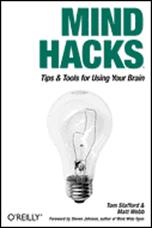|
|
Book Review: "Mind Hacks: Tips & Tools for Using Your Brain"
by Don Chiasson
O’Reilly
Media is well known for publishing books, particularly on
open source software. The company has published a number
of books in a popular “Hacks” series, such as
“Google Hacks”, “Mac OS X Hacks”,
“Linux Server Hacks” and others, a total of
about 50 titles. I have “Online Investing Hacks: 100
Industrial-Strength Tools & Tips” and found it
useful. As you might expect, there is a Hacks web page at
http://hacks.oreilly.com. The formula for the books is to
have 100 hacks (or tips) divided by topic into several
chapters.
“Mind Hacks” is different in the O’Reilly
stable in that it is not computer related. The back cover
has the key word Psychology. The Ottawa Public Library
has the book and the subjects it is listed under include
Brain; Thought and thinking; Visual perception;
Attention; and others. No mention of computers.
The ten chapters of Mind Hacks give an idea of the span
of material: Inside the Brain; Seeing; Attention; Hearing
and Language; Integrating; Moving; Reasoning;
Togetherness; Remembering; and Other People. There are
100 hacks, so each chapter covers about ten hacks or
topics. Omitting index, foreword, and so on the book has
344 pages, so each hack is just under three and a half
pages. Typically, each hack is structured to include a
summary, “In Action”, “How it Works”
and “End Note.”
The book is well organized, with interesting topics. Each
topic essentially stands alone, so it is difficult to
give a broad-brush review of the book or discuss
continuity. Discussing each chapter, let alone each hack
goes beyond a short review such as this. Each hack
covered a particular topic well: intelligent and not
trivial while avoiding jargon or pretentiousness.
What did I like? Chapter Seven, “Reasoning Hacks 70
– 74” was my favourite part of the book. These
were indeed hints on thinking, particularly numbers. Hack
70 notes that our brains haven’t evolved to think
about numbers and that funny things happen to numbers as
they go into our heads. Hack 71 points out how it is
better to think about frequency of occurrences rather
than about probabilities.
Hack 87 talks about using context to improve memory. Then
there is Hack 92, “Make the caffeine habit taste
good.” “Caffeine chemically hacks the
brain’s reward system, boosting the value we give
not only to the morning cuppa, but also to everything
associated with it.” In other words, the context of
your coffee or tea is important to the enjoyment.
What didn’t I like? I found Chapter Two,
“Seeing” not as compelling as it could have
been. To my mind, optical illusions provide amusement
while at the same time demonstrating vagaries of how our
vision works. The examples provided were not as good as
they should have been.
In spite of the subtitle, “Tips & Tools for
Using your Brain” I did not think the book was aimed
at improving the reader’s brainpower. It is not a
manual for how to increase your memory or improve your
mathematics, though this could happen by understanding
how your brain does work. Though the book covers a number
of topics well, it is not comprehensive as it chooses
interesting micro topics rather than a macro view. That
statement is not a criticism but rather a description of
the philosophy of the book.
Is “Mind Hacks” a good book? Definitely yes. It
is not a book for serious study, but it contains a lot of
interesting information. Because each hack stands alone
(though there is some cross-referencing), it is a good
book to graze allowing you to read a few pages then lay
it aside and pick it up later, perhaps reading a
different topic. Traveling or going to the cottage? Buy
or borrow a copy of “Mind hacks.” You will
relax and increase your knowledge.
 Bottom Line:
Bottom Line:
“Mind Hacks: Tips & Tools for Using Your Brain”
Tom Stafford and Matt Webb
Published by O’Reilly Books (2005)
394 pp. Price: $36.95
Dimensions: 23cm by 16cm by 2.3cm.
http://www.oreilly.com
For an OPCUG discount on this and other O'Reilly books, visit:
http://opcug.ca/promos.htm
Originally published: November, 2005
top of page
|
Archived Reviews
A-J
K-Q
R-Z
The opinions expressed in these reviews
do not necessarily represent the views of the
Ottawa PC Users' Group or its members.
|